- Home
- Robert Fulghum
It Was On Fire When I Lay Down On It Page 11
It Was On Fire When I Lay Down On It Read online
Page 11
Dear Fellow Pilgrim:
There you were, Hong Kong airport, end of the summer of 1984, tensely occupying a chair next to mine. Everything about you said “Young American Traveler Going Home.” You had by then exchanged jeans and T-shirt for sarong and sandals. Sensible short hair had given way to hair long and loose. The backpack beside you bore the scars and dirt of some hard traveling, and it bulged with mysterious souvenirs of seeing the world. Lucky kid, I thought.
When the tears began to drip from your chin, I imagined some lost love or the sorrow of giving up adventure for college classes. But when you began to sob, you drew me into your sadness. Guess you had been very alone and very brave for some time. A good cry was in order. And weep you did. All over me. A monsoon of grievous angst. My handkerchief and your handkerchief and most of a box of tissues and both your sleeves were needed to dry up the flood before you finally got it out.
Indeed, you were not quite ready to go home; you wanted to go further on. But you had run out of money and your friends had run out of money, and so here you were having spent two days waiting in the airport standby with little to eat and too much pride to beg. And your plane was about to go. And you had lost your ticket. You cried all over me again. You had been sitting in this one spot for three hours, sinking into the cold sea of despair like some torpedoed freighter. At moments you thought you would sit there until you died.
After we dried you off, I and a nice older couple from Chicago, who were also swept away in the tide of your tears, offered to take you to lunch and to talk to the powers that be at the airlines about some remedy. You stood up to go with us, turned around to pick up your belongings. And SCREAMED. I thought you had been shot. But no … it was your ticket. You found your ticket. You had been sitting on it. For three hours.
Like a sinner saved from the very jaws of hell, you laughed and cried and hugged us all and were suddenly gone. Off to catch a plane for home and what next. Leaving most of the passenger lounge deliriously limp from being part of your drama.
I’ve told the story countless times. “She was sitting on her own ticket,” I conclude, and the listeners always laugh in painful self-recognition.
Often when I have been sitting on my own ticket in some way—sitting on whatever it is I have that will get me up and on to what comes next—I think of you and grin at both of us and get moving.
So, thanks. You have become, in a special way, my travel agent. May you find all your tickets and arrive wherever it is you want to go, now and always.
LIKE MANY WESTERNERS IN THE LATE SIXTIES, I wanted to be somewhere else in my religious journey. Confusion reigned in the kingdom of my mind, and I yearned to construct a framework of understanding that seemed beyond my present cultural tools. I couldn’t seem to get “there” from “here.”
Zen and its idea of enlightenment appealed to me. That one might sit very still and empty one’s mind and suddenly be hit by a mighty wave of comprehension beyond words—well, that would do. Hit me with the big news and let me walk away with a sense of “I get it!”
Took a leave of absence from my dailiness and went off to Japan to get Zenned properly. Got connected to a temple and a master. Shaved my head and face, put on the drab gray robe of the novitiate, and stood in line to get enlightened. Figured to become a pretty holy man in pretty short order, like in about six weeks, which was when my return ticket home expired. Right.
But of course it was not to be. Sitting still gave me hallucinations and cramps, but not enlightenment. The food gave me diarrhea. Sleeping on a board gave me a backache. And my fellow monks treated me like a Western fool, laughing at me behind my back. It was one of those times when you know enough to realize there’s something everybody but you knows, but you don’t know enough to know exactly what it is you don’t know.
But I did know it was time to leave.
To my surprise, an invitation was extended for an interview with the master of the temple. Which was like a stockboy being asked to have lunch with the president of the company.
Since it was largely because of his reputation that I had chosen this particular temple, and since he rarely spent time with tourists like me, the master’s invitation seemed a special honor.
Manabu Kohara, Ph.D. in economics from Tokyo University, solver of all the Zen koans (mind puzzles), adviser to captains of industry, writer of books, speaker of seven foreign languages, a paradigm of the great teacher. Wise, good, respected, accomplished. If he didn’t have “it” all figured out, then nobody did.
After I was ushered into his private study, we knelt on cushions and bowed our mutual respect. He out of courtesy and I out of awe. For a long time he looked at me and into me.
Very deliberately he shifted his weight to one knee, and just as deliberately reached for his backside and scratched himself in that way and in that place your mother told you was a no-no in public.
“I have hemorrhoids. They hurt and itch.”
There was nothing in my mental manual as to how to reply to such an opening remark. I kept my mouth shut and pretended to be thoughtful.
“The hemorrhoids come from stress, you know. From worrying about tourists burning down this firetrap of a temple. From worrying about trying to get enough funding from businessmen to keep it in repair. From arguing with my wife and children, who are not as holy“—he smiled—”as I am. And from despairing over the quality of the lazy young fools who want to be priests nowadays. Sometimes I think I would like to get a little place in Hawaii and just play golf for the rest of my life.”
He leaned to one side and scratched himself again.
“It was this way before I was ‘enlightened,’ you know. And now it is the same after enlightenment.”
A long pause while he silently gave me time to consider his words and actions.
Rising, he motioned me to follow him to the entrance alcove of the temple, and we stood before an ancient scroll I had often passed. He said it was time for me to go home, where he felt I had been a “thirsty man looking for a drink and all the while standing knee-deep in a flowing stream.” Yes.
Then he read the words of the scroll slowly, first in Japanese and then carefully translated into English:
There is really nothing you must be.
And there is nothing you must do.
There is really nothing you must have.
And there is nothing you must know.
There is really nothing you must become.
However. It helps to understand that fire burns,
and when it rains, the earth gets wet …
“Whatever, there are consequences. Nobody is exempt,” said the master.
With a wink, he turned and walked away.
Carefully scratching his backside.
IN THE BEGINNING OF BOOKS and at the end of movies, there appear the “credits.” Lists of those to whom recognition and appreciation are due. Without whom the book or movie was not possible. In that spirit, as one summer ends, I write my own credits. These people (and some bugs and dogs) made life sing for me with unknowing gifts.
Thanks to the large man in the red dump truck—for the mercy of not blowing his air horn at me while I sat daydreaming through a green light.
Thanks to the small puppy dog trying desperately to make love to a much larger senior lady dog, reminding me that high hopes are part of passion and that lust is often blind. (The patient toleration of the object of his affection is likewise applauded. What harm?)
Thanks to the fat, waffled, wrinkled, graying old lady in the faded blue bathing suit, sitting in the children’s wading pool in the park on the hottest day of the summer, taking on all comers in a splashing contest—for reminding me of what real beauty is and that childhood can be forever.
Thanks to the small boy in the grocery store who grabbed me from behind around my knees and hugged me and called me “Daddy,” and who hugged me once more even when he saw I wasn’t his daddy—for handing out free samples of small joy.
Thanks to whoeve
r planted marigolds in the parking strip on Fifteenth Avenue. Not content with making a small piece of no-man’s-land beautiful, you added the sign that said: flowers—have some.
Thanks to the three young white women playing heads-up, in-your-face, knees-and-elbows-and-take-no-prisoners hard-hat basketball with the young black court hotshots one morning by the lake. And thanks to the young black court hotshots who picked the girls for their team in the first place because they could really play basketball—for showing me that the ERA is not dead in all the courts of the land.
Thanks to ex-president Jimmy Carter for spending his summer rebuilding houses for poor people with the Humana group. The value of your presidency is still to be judged by history, but the powerful example of your character shines now.
Thanks to the four deaf people speaking sign language at the market that Saturday, who I knew were telling jokes (don’t know how, but I knew)—for including me in the laughter without words.
Thanks to the Dixieland band that showed up to play in the park that Sunday afternoon just for the fun of it, and played as if it were a birthday party for everyone on earth—for making me forget that people die.
Thanks to the old geezer playing the harmonica in front of the drugstore downtown, who when asked where to put money, said he didn’t do it for the money but for the company, and wore a T-shirt that said: over the hill and on a roll—for making me look forward to getting older.
Thanks to the flat-chested young woman at the swimming hole who bravely stood her ground while the policeman wrote her a ticket for indecent exposure for going without her top—and thanks to the policeman who didn’t insult her by leaving her out of the arrest procedure when handing out tickets to the more amply endowed—for keeping dignity alive and part of justice.
Thanks to the mailman in my old neighborhood who still remembers my name long after I moved away—for delivering friendliness first and the mail second.
Thanks to the disabled man riding in the electric wheelchair with the sign on the back: honk if you’re horny—for reminding me of the courage of good humor.
Thanks to the spiders of August who kept me walking slowly and alert and aware through my garden—morning and evening—for making me see their work and think about my own.
Thanks to the old mongrel dog that came and sat quietly beside me one morning by the lake—for selecting me to receive his silent, undemanding company. I was honored that he would sit by me.
Thanks to the janitor who sings in the halls of the building where I work—for putting “Keep on the Sunny Side” in my mind at day’s end.
Thanks to the service-station attendant who washed my car windows anyway, even though I was at the self-service pump—for reminding me that I should not go around not seeing all there is to see.
And there is more. The gifts of the summer were abundant, and there is more news of the world than is reported in the daily paper. And the news is good. The gifts are free.
THERE IS A BENCH IN THE CITY WHERE I LIVE. Its structure is simple—three slabs of smooth gray granite, each six inches thick. The seat piece is sixteen inches wide by forty-two inches long. The two supporting legs are sixteen inches high. Having checked with a compass to be certain, I can tell you that the bench has been carefully aligned so that its long sides face east and west and its two ends point north and south.
This sturdy seat was placed with purpose on the highest ground on the highest hill in my city. So that when the sky is clear on a summer’s morning, you can see almost sixty miles in three directions while sitting on the bench.
West lies Puget Sound—
East the mighty Cascades run free—
North is the University—
South, a great tree.
All these things were loved by me.
These words are chiseled into the edge of the bench and are an epitaph. For the bench is, in fact, a tombstone in a cemetery. And I would take you there to sit if I could.
You wouldn’t feel uncomfortable sitting on it, I promise. You wouldn’t even notice what it was at first. It’s right on the edge of a paved lane that curves through the burial grounds, placed so that you are clearly invited to use it. The closest living thing is a dawn redwood tree, comforting in its great age and size—a stout and worthy companion.
The placement of this bench, the words on the edge, the consciousness of the view—all say that someone went to a lot of trouble to be useful in death. A parting gesture of quiet generosity has been made.
In over twenty-five years as a clergyman, I have been involved in hundreds of funerals—in the dying that went before and the burial that came after. There is an inevitable narcissism therein—a focus on self: what I want for MY funeral and what I want done with MY body and what I want for MY epitaph—a very human holding-on to identity as long as breath and granite last. The monuments left behind in the hallowed ground serve to separate the dead from the living and the dead from one another. For me, tombstones are markers of loneliness.
But this bench I speak of is another story. Unique. No name. No conventional epitaph. And no dates. Just an unspoken open invitation for anyone to sit and think. What marks this grave is the gift of silent companionship that bridges loneliness. In all the cemeteries I have visited around the world, I have seen nothing like it—and nothing so fine.
That bench has become a spiritual retreat for me over the years. And I know that I am not the only one to use it, for once I found a note taped under the bench. Not for me; for a young woman from a young man who was in love with her and wrote her careless poetry with great passion. (No, I’m not sorry I snooped; and yes, I put it back as I found it; and no, I didn’t hide in the bushes to see who came for the note. Secret lovers have enough to worry about as it is.)
Twice I have shared the bench with strangers. I can’t explain how we each knew the bench was important to the other and that company was welcome. We just knew, that’s all. We sat in silence and went our ways.
And it was on that bench, the summer morning after my fiftieth birthday, that I came to that moment in life when one crosses over from the abstract intellectual knowledge that all human beings die to the active realization that I will die. Me. Fulghum. Will not be. Sooner or later.
Not only did I realize that I will die, but I walked away thinking, Well, it’s okay.
I connect that moment of enlightenment with the peculiar sanctuary of the bench and whoever provided it. I accept the challenge of my unknown benefactor to also leave behind some gift for the living instead of a useless stone marking personal real estate.
That bench will last hundreds of years. Many people will sit on it and think not of the name of its owner but of the nameless joys of this sweet life and the mystery of death and how utterly amazing it all is, and that somehow, sometimes, things are just as they should be.
I WRITE TO YOU ON A THURSDAY NIGHT in February, the fortieth day in the year 1989. Winter in Seattle, Washington, USA; clear skies and a new moon.
Though life and stories and writing continue, for now I have come to the place where my work on this volume is done. Tomorrow, the manuscript goes to New York and into the production process that turns it into a book. The letting go is not easy—it’s like sending a child off to finishing school.
Some readers may notice that a few of the stories promised on the last page of the Kindergarten book did not show up in this one. How come? Answer: Do you ever go off with a long grocery list and come home from the store with a bunch of different stuff? And somebody in the family unsacks the groceries and wants to know why you got this and didn’t get that and just where is the whatever? And you want to say, “Well, just be glad I came back, okay?” And the unpacker says, “Well, next time bring what’s on the list.” Yes, next time I will tell you about frogs, a sign in a grocery store in Pocatello, Idaho, the Salvation Navy, and the smallest circus in the world. Promise.
Pretty soon now I am going to get into my going-to-bed ritual mode. Not unlike yours, I suppose. Walking
through the house, I will turn off lights, check latches on doors, turn down the heat, check the refrigerator one more time to see if anything like chocolate ice cream has miraculously appeared there since the last time I looked, around nine o’clock. Then I’ll find my way in the dark, by automatic pilot, up the stairs and into bed next to my sleeping wife. There’s always a silent laugh at this moment. She wears a black eyeshade, so it’s like getting into the sack next to the Lone Ranger. But I always liked the Lone Ranger, and I always say to myself, “The faithful Indian, Tonto, is here.” It’s my own dumb joke, and I never say it out loud anymore. But I think it. And go to bed amused, which is not such a bad way to turn in for the night, silly joke or no.
Anyway. Next I will get my pillows all shoved around the way I like them, set the alarm, and lie back into that state of being between waking and sleeping. My daytime mind wants to continue sorting the incoming mail and working on the things-to-do list. But I will think to myself, as I have thought as long as I can remember: This day was full—tomorrow’s work is for tomorrow. In the meantime, what I need is sleep. Everyone else is asleep, why not me? If I sleep well, the tasks of another day will go well. Sleep, Fulghum, sleep. And I do. This is not exactly a bedtime prayer in the traditional sense, but it supposes peace through the night and a hope for a productive life the next day. Prayer enough, I suppose.
This particular night I go to bed with laughter on my mind. I have read through the manuscript one last time and surprised myself by finding passages that are still funny to me, even after many readings. Humor is a bit suspect—conventional wisdom says it takes away from serious writing. So I wonder if the funny parts should be trimmed out. I think not—and here’s why:
To get through this life and see it realistically poses a problem. There is a dark, evil, hopeless side to life that includes suffering, death, and ultimate oblivion as our earth falls into a dying sun. Nothing really matters.

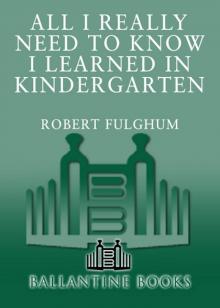 All I Really Need to Know I Learned in Kindergarten
All I Really Need to Know I Learned in Kindergarten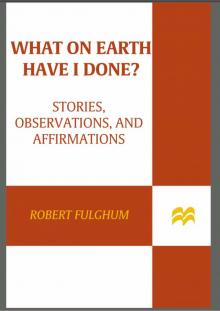 What On Earth Have I Done?
What On Earth Have I Done?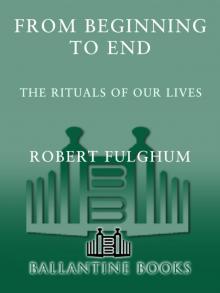 From Beginning to End
From Beginning to End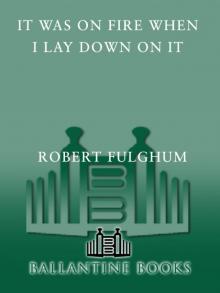 It Was On Fire When I Lay Down On It
It Was On Fire When I Lay Down On It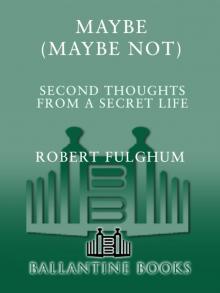 Maybe (Maybe Not)
Maybe (Maybe Not)